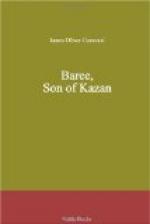If he could only find something to eat! That was the master thought that possessed Baree. Instinct had not yet impressed upon him that this which he saw all about him was starvation. He went on, seeking hopefully for food. But at last, as the hours passed, hope began to die in him. The sun sank westward. The sky grew less blue; a low wind began to ride over the tops of the stubs, and now and then one of them fell with a startling crash.
Baree could go no farther. An hour before dusk he lay down in the open, weak and starved. The sun disappeared behind the forest. The moon rolled up from the east. The sky glittered with stars—and all through the night Baree lay as if dead. When morning came, he dragged himself to the stream for a drink. With his last strength he went on. It was the wolf urging him—compelling him to struggle to the last for his life. The dog in him wanted to lie down and die. But the wolf spark in him burned stronger. In the end it won. Half a mile farther on he came again to the green timber.
In the forests as well as in the great cities fate plays its changing and whimsical hand. If Baree had dragged himself into the timber half an hour later he would have died. He was too far gone now to hunt for crayfish or kill the weakest bird. But he came just as Sekoosew, the ermine, the most bloodthirsty little pirate of all the wild—was making a kill.
That was fully a hundred yards from where Baree lay stretched out under a spruce, almost ready to give up the ghost. Sekoosew was a mighty hunter of his kind. His body was about seven inches long, with a tiny black-tipped tail appended to it, and he weighed perhaps five ounces. A baby’s fingers could have encircled him anywhere between his four legs, and his little sharp-pointed head with its beady red eyes could slip easily through a hole an inch in diameter. For several centuries Sekoosew had helped to make history. It was he—when his pelt was worth a hundred dollars in king’s gold—that lured the first shipload of gentlemen adventurers over the sea, with Prince Rupert at their head. It was little Sekoosew who was responsible for the forming of the great Hudson’s Bay Company and the discovery of half a continent. For almost three centuries he had fought his fight for existence with the trapper. And now, though he was no longer worth his weight in yellow gold, he was the cleverest, the fiercest, and the most merciless of all the creatures that made up his world.
As Baree lay under his tree, Sekoosew was creeping on his prey. His game was a big fat spruce hen standing under a thicket of black currant bushes. The ear of no living thing could have heard Sekoosew’s movement. He was like a shadow—a gray dot here, a flash there, now hidden behind a stick no larger than a man’s wrist, appearing for a moment, the next instant gone as completely as if he had not existed. Thus he approached from fifty feet to within three feet of the spruce hen. That was his favorite striking distance. Unerringly he launched himself at the drowsy partridge’s throat, and his needlelike teeth sank through feathers into flesh.




